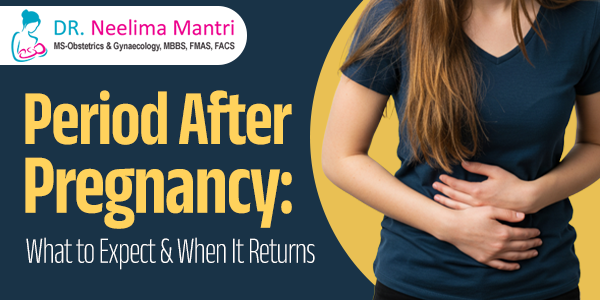
by Dr Neelima Mantri | Jan 21, 2026 | Blog, Gynecologist
Pregnancy changes the body in many ways. One of the most common questions women ask after giving birth is when their period will return. Some expect it to come back within weeks, while others may not see it for several months. Every experience is different. That is why understanding the timing and nature of your first period after delivery can help you prepare better for the postpartum phase.
When Do Periods Return After Pregnancy?
The return of menstruation after childbirth does not follow a set rule. It depends on how the body heals and whether the woman is breastfeeding. For some, the first period may arrive within six to eight weeks. For others, it may take longer.
Hormones play a large role in this timing. If you are not breastfeeding, your period may come back sooner. But if you are nursing, especially exclusively, your cycle may pause for several months. Many women wonder how long after delivery do periods return, but there is no fixed number. Every body works at its own pace.
How Breastfeeding Affects Periods After Delivery
Breastfeeding affects hormone levels. The hormone responsible for milk production, called prolactin, also delays ovulation. This is why many women do not get their periods while breastfeeding. However, it is still possible to ovulate and become pregnant even before the first postpartum period.
Hence, it is imperative to use protection [if you are not planning another pregnancy]. Periods after breastfeeding often return once feeding frequency drops or solid foods are introduced. This process can vary, so staying alert to changes in the body is always helpful.
What to Expect From Your First Period After Childbirth
The first period after childbirth may feel different from your pre-pregnancy cycle. It could be heavier, lighter, more painful, or completely irregular [as these changes are linked to hormone shifts and uterine recovery].
Postpartum periods may also bring more noticeable mood changes and fatigue. Some women report heavy flow or clots [especially during the first few cycles]. For women who had a caesarean, periods after C-section may also vary. Healing from surgery can affect the uterus and change the flow or timing for a few months.
When to See a Gynaecologist for Postpartum Period Problems
If your periods remain extremely heavy, painful, or irregular beyond a few cycles, it is best to speak to a doctor. You should also watch out for signs such as foul-smelling discharge, large clots, or sudden cramps [indicating infection or other complications]. When cycles do not return even after stopping breastfeeding for months, medical review is important.
Therefore, seeking assistance from a trusted Gynaecologist in Mumbai streamlines and manages such complications. Be sure to consult Dr Neelima Mantri for ongoing support during postpartum recovery and menstrual health.
Conclusion
The journey through postpartum recovery includes more than just feeding and rest. Understanding your period after pregnancy is an important part of staying in tune with your health. Some women get their period within weeks while others wait several months.
The return of menstruation after childbirth may bring some surprises [be it a vaginal delivery or a C-section]. Each cycle is your body’s way of returning to balance. By paying attention and seeking help when needed, you can make this transition smoother and more manageable.
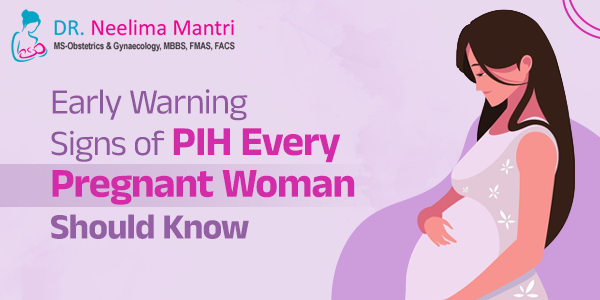
by Dr Neelima Mantri | Jan 12, 2026 | Blog, Women Health Issues
Pregnancy is a significant development in every couple’s life. It brings joy along with unexpected complications. High blood pressure is one such complication that begins after the fifth month. This condition is called Pregnancy-Induced Hypertension [or PIH]. It often starts without warning and can affect both the mother and the baby. That is why it is important to understand how PIH begins and what early signs must not be ignored. Spotting the condition early often leads to safer outcomes for everyone involved.
What Is Pregnancy-Induced Hypertension (PIH)?
Pregnancy-Induced Hypertension is a condition where blood pressure rises after 20 weeks of gestation. It affects women who had normal blood pressure before pregnancy. The condition is different from chronic hypertension because it begins only after the pregnancy advances. If ignored, PIH may lead to complications involving the kidneys, liver and the placenta. In some cases, it may progress to preeclampsia or affect the growth of the baby.
Early Warning Signs of PIH You Should Not Ignore
The signs of PIH may not be obvious at first. Many symptoms may seem like routine discomforts of pregnancy. But certain changes must not be dismissed. The most common early warning signs of PIH in pregnancy include swelling in the face or hands, blurred vision and severe headaches. Other signs may include upper abdominal pain or sudden weight gain without changes in diet. Some women may also feel short of breath or pass less urine than usual.
Risk Factors That Increase the Chances of PIH
Not all women face the same risk of developing PIH. Some are more prone due to health conditions or previous pregnancy issues. Carrying twins or being over the age of 35 raises the chances. First-time mothers are also more likely to develop this condition.
Medical history plays a strong role. Women with diabetes along with kidney disease and autoimmune disorders are at higher risk. If a close family member has faced PIH in the past, then extra care is advised throughout the pregnancy.
When to Seek Medical Help for High Blood Pressure in Pregnancy
High blood pressure should never be ignored during pregnancy. Medical attention becomes necessary if your readings remain above 140/90 mmHg after 20 weeks. Knowing when to consult a gynaecologist for high BP can help prevent major complications.
Doctors may monitor your blood pressure and suggest extra tests to assess your kidney function, liver health and fetal growth. In some cases, pregnancy hypertension treatment may include rest along with medication and frequent follow-up visits.
Conclusion
The body often reacts before a condition becomes serious. Thus, early signs must be treated with care, not confusion. Some symptoms may seem harmless, but they might signal a larger concern. Ignoring them can delay important care and increase risk. Regular check-ups do help, but personal awareness plays an equal role in keeping pregnancy safe.
If you feel off or experience any change that does not feel normal, it is best to act early. Consulting a trusted Gynaecologist in Mumbai ensures you get the right advice without waiting too long. Dr. Neelima Mantri is widely regarded as the best female gynaecologist in Mumbai. She is known for her practical approach and ongoing guidance throughout pregnancy.
Learning about the complications of PIH helps you take control of your decisions. It prepares you to face issues with clarity instead of panic. Most women who act on time receive the care they need and go on to deliver safely. That is why awareness is not just helpful. It is essential for peace of mind.
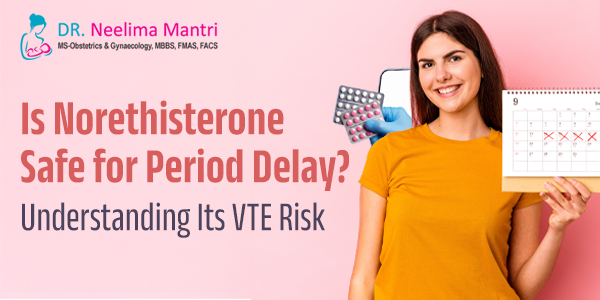
by Dr Neelima Mantri | Dec 22, 2025 | Blog, Gynecologist
Delaying your period can feel like a simple choice when you are planning a trip, wedding, or exam schedule. Many women turn to medication for this purpose, especially if their cycle is regular but inconvenient. One such option is norethisterone. It is often prescribed to hold off menstruation for a few days or even up to two weeks. But what about the risks? Is it really safe for everyone? Join us as we debunk these fundamentals.
What Is Norethisterone and How Does It Delay Periods?
Norethisterone is a synthetic hormone that is similar to progesterone. It works by ensuring that the uterine lining continues to develop and does not come off prematurely. When taken a few days before the period is expected, this postpones the onset of the bleeding until the tablets are stopped.
The typical dosage is 5 mg taken three times a day. Most doctors suggest using it for no more than 17 days. Once you stop the medication, the period usually begins within two to three days. The method is reliable for most users and offers short-term control over timing.
Is Norethisterone Safe? Understanding Its Benefits and Common Side Effects
For many, the answer is yes! In the short term, and when properly prescribed, norethisterone usually is well tolerated. It has been used for decades and is deemed to be a practical tool to delay bleeding.
However, norethisterone’s safety for period delay must be viewed case by case. Some users report mild side effects such as nausea, headache, mood changes, and breast tenderness. In a few cases, women notice spotting or period changes in the cycle that follows.
Still, these are manageable for most. The real concern arises when norethisterone is taken by people with underlying health risks.
VTE Risk: Can Norethisterone Increase Blood Clot Formation?
One of the serious concerns is the possibility of a blood clot. This is referred to medically as venous thromboembolism (VTE). The condition can include deep vein thrombosis (usually in the leg) or pulmonary embolism (clot reaching the lungs).
The VTE risk menstrual delay pills carry is low but still important. Since norethisterone acts like progesterone, it may increase clotting tendency slightly. For someone with no other risks, this may not be a problem. But if you have a history of blood clots, obesity, recent surgery, or a strong family history, you must tell your doctor before starting the medication. Understanding the blood clot risk with norethisterone is crucial, especially in hot or long-distance travel situations where the body may already be under stress.
Who Should Avoid Norethisterone? Safer Alternatives for Period Delay
The list includes those with past clotting disorders, certain liver conditions, hormone-sensitive cancers, or unexplained vaginal bleeding. The guidance on who should not take norethisterone also applies to those with migraine with aura, poorly managed blood pressure, or active cardiovascular problems.
In such cases, other solutions may be recommended. Some oral contraceptives or IUD-based approaches may offer better control with reduced risk. Consulting a gynaecologist before using any hormonal pill for delay is essential.
Women seeking a safer option can start by speaking with experts. Many consider the best gynaecologist for menstrual issues Mumbai for personalised advice, especially before taking medication for non-medical timing reasons. Patients facing recurrent hormonal disturbances may benefit from long-term evaluation and period irregularities treatment Dr Neelima Mantri or other qualified professionals provide in major centres.
Conclusion
Delaying a period using medication can feel like a convenience, but it must be handled with care. Norethisterone is effective for many, but not risk-free. Understanding when to use it and when to skip it protects your health while giving you more control over your cycle. It is always better to choose informed care over quick fixes. Speak to a trusted gynaecologist before making any changes to your hormonal routine.
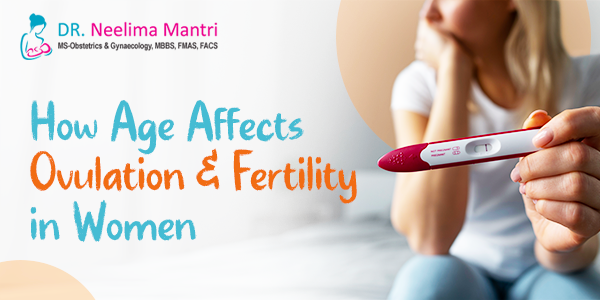
by Dr Neelima Mantri | Dec 10, 2025 | Blog, Female Gynaecologist
Fertility is shaped by many factors, but a woman’s age remains one of the most important. As the years pass, subtle changes begin to affect ovulation and reproductive capacity. These changes are biological and cannot be paused. Many women learn about them only after trying to conceive without success. That is why awareness is vital. Knowing how your age may affect fertility can help you take steps at the right time.
How a Woman’s Age Influences Ovulation
Ovulation happens when the ovaries release a mature egg. In the early twenties, most women ovulate regularly. This makes it easier to conceive during that phase of life. But as a woman moves into her thirties, hormone levels start to shift. Some cycles may not include ovulation at all, even when periods appear normal.
The ovaries begin to respond less to signals from the brain. As a result, ovulation becomes less predictable. This shift is not sudden. But it makes it harder to conceive as you grow older. Understanding how age affects ovulation and fertility in women allows you to prepare rather than panic.
Age-Related Decline in Egg Quantity and Quality
Each woman is born with a limited number of eggs. That number begins to fall right from birth. By puberty, the egg count is already lower. In the twenties and early thirties, enough good-quality eggs remain to support pregnancy.
By age 35, both egg quantity and quality drop more sharply. Older eggs are more likely to have chromosomal problems. This may result in failed implantation or miscarriage. Even if the woman is otherwise healthy, poor egg quality can reduce her chances of a full-term pregnancy. This is a natural part of female reproductive health and ageing.
Fertility Challenges After 30, 35, and 40
Fertility does not collapse overnight. But the chances of getting pregnant change with time. In the early thirties, conception may take longer. After 35, the decline becomes more visible. It may take months instead of weeks. Some women may need medical advice even if they have regular cycles.
By 40, the chances of natural pregnancy become lower. At this stage, some women also face problems like fibroids or hormonal imbalances. If you are wondering when does fertility decline in women, the answer often lies between 30 and 35. Beyond that, extra support may be necessary.
Ways to Support Fertility at Different Ages
There are steps you can take at any age. Eating well, staying active, and tracking your cycles can all make a difference. Reducing alcohol and quitting smoking can also help preserve fertility. Women above 30 should consider basic tests to assess hormone levels and egg reserve.
Those trying to conceive after 35 may benefit from speaking to a specialist. For example, a female fertility doctor in Mumbai can suggest tests or treatments. If needed, female infertility treatment in Mumbai is available for women who want to explore assisted methods. Early action gives better control.
If you are looking for practical support, start by reading fertility tips for women over 30 and create a plan that suits your body and lifestyle.
Conclusion
The best age for pregnancy depends on many things, but your body works on a natural timeline. Fertility starts to decline slowly after the age of 30 and more quickly after the age of 35. By knowing what you’re looking for, you can take steps to protect your chances. Whether through changes in your lifestyle or the advice of professionals, staying informed helps you act with confidence when the time is right.
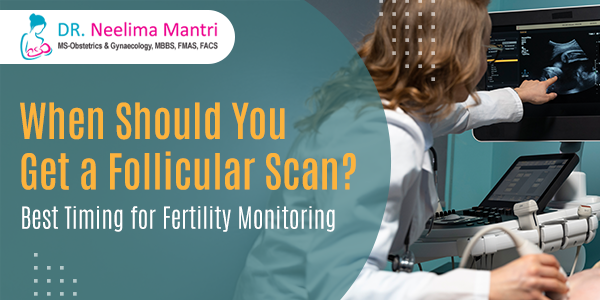
by Dr Neelima Mantri | Oct 16, 2025 | Blog, Female Gynaecologist
A follicular scan helps track ovulation in real time so you can plan your pregnancy with greater accuracy. Many women often ask, “When should I get a follicular scan?” Because timing decides how useful the scan will be for fertility planning. The process maps egg growth and shows when your body is ready to release a mature egg.
Understanding Why Follicular Scans Matter
Each month, your ovaries prepare follicles that carry developing eggs. A follicular scan measures their size and growth to see when one becomes dominant. It helps your doctor find the answers to the fundamental question “What is the right time for fertility monitoring?”. So your chances of conception improve naturally or through treatment. The test is non‑invasive and safe for all age groups.
Best Time to Begin the Scan
The best time for a follicular scan depends on your menstrual cycle length. Most doctors begin scanning between the eighth and tenth day of your period. You may need repeat sessions every two or three days until ovulation occurs. This allows the doctor to identify the most fertile phase with precision and prevent missing the ovulation window.
How the Procedure Tracks Ovulation
The scan uses an internal ultrasound that gives a clear image of your ovaries. Each session records how follicles mature and prepares you for ovulation. The images show if the egg is ready to release. This makes the best time for a follicular scan easier to predict for your next cycle, too.
Why Timing Is Key in Fertility Monitoring
The right will help your doctor to match your fertile period with your natural hormone cycle. The ovulation usually takes place mid-cycle of a normal cycle. Follicle monitoring at this stage will enable you to know whether your body is working as expected. It also gives the answer to the question of when is the right time to monitor fertility? with the right medical information as opposed to speculation.
Benefits of a Timely Follicular Scan
- Tracks the development of eggs in real time.
- Ovulation can be checked visibly.
- Organises sex or fertility therapy.
- Determines any abnormal or delayed ovulation.
- Feel assured during your fertility process.
Finding the Right Expert for the Scan
You will be guaranteed the continuity of your follicular monitoring and its interpretation by choosing the most qualified female gynaecologist in Mumbai. Not only will an experienced Gynaecologist in Mumbai scan, but they will also explain the findings. It is also targeted at sensitising you to the pattern of your body in order to make good fertility decisions.
Personalised Guidance for Better Results
If you are trying to conceive and wondering when to get a follicular scan? It helps to consult a specialist early. Regular tracking gives you control over timing and clarity about your cycle.
For expert fertility care and precise follicular monitoring, consult Dr Neelima Mantri, the best female gynaecologist in Mumbai, known for guiding women through every stage of fertility management with accuracy and care.
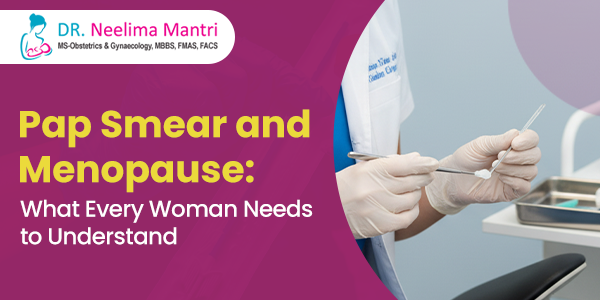
by Dr Neelima Mantri | Oct 6, 2025 | Blog, Female Gynaecologist
Many women assume that routine tests like a Pap smear are no longer required once menopause begins. The truth is that menopause introduces hormonal changes that can silently impact cervical health. Skipping screenings during this stage can allow risks to go undetected. Understanding the link between Pap smear and menopause is the first step toward long-term protection.
Cervical cancer does not pause with ageing
While fertility stops with menopause, the cervix remains just as susceptible to abnormal changes. Human papillomavirus can stay dormant in the body for years and may become active again when oestrogen levels drop. This reactivation risk is why a regular Pap test remains relevant for women past the age of fifty. The question Why is a Pap smear important during menopause? finds its answer in this continued vulnerability.
Changes in the cervix are harder to detect without testing
As oestrogen drops, the cervix may shrink slightly, and the tissues can become thinner and more fragile. These changes may make infections or precancerous conditions harder to detect during a basic pelvic exam. A Pap smear remains the most reliable method to examine cells for abnormalities in women who are experiencing or have completed menopause. Common symptoms linked to menopausal cervical health shifts include:
- Postmenopausal bleeding or spotting
- Vaginal discharge with unusual texture or colour
- Pain during intimacy or pelvic discomfort
- Persistent itching or dryness despite local treatment
- Infections that recur despite good hygiene and care
Pap smear timing should match your health history
Women above the age of sixty-five may not need a Pap test if they have had consistently normal results for over ten years. But for many who have missed regular check-ups or faced health changes, continuing screenings is wise. A detailed conversation with the best female gynaecologist in Mumbai can help decide the right timeline based on your individual case.
Your overall treatment journey matters too.
Managing Menopause Symptoms and Treatment in Mumbai must include regular assessments of both hormonal and reproductive health. From bone density to heart rhythm and cervical changes to mood swings, everything connects during this transition. The body continues to evolve through postmenopause, and that requires continued medical guidance.
Every woman deserves honest and personalised care
Some women may feel uncomfortable discussing intimate issues or asking about a Pap test during later years. Choosing the best gynaecologist in Mumbai makes those conversations easier and more productive. A good practitioner will always ensure you feel heard and supported during every stage of life.
Menopause is not the end of gynaecological care
Asking Why is a Pap smear important during menopause? Leads to answers that protect your future health. Do you know how menopause impacts cervical health? Ensures you stay aware of changes that deserve early medical attention. These questions are not just medical queries but essential reminders of how important self-awareness is during every phase.
For those seeking ongoing guidance across menopause and gynaecological health, Dr Neelima Mantri offers expert care and trusted insights tailored to your body’s evolving needs.
Page 1 of 4912345...102030...»Last »







